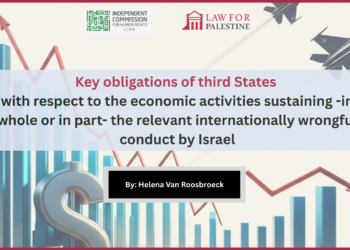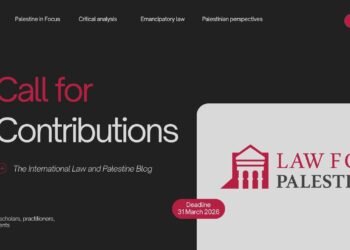Legal Opinion on Luxembourg’s Hosting of Israeli Bonds*
Executive Summary
This legal opinion concludes that Luxembourg’s approval of a prospectus for Israel Bonds for trading on the EU market carries a high risk of violating its fundamental obligations under international law. The analysis is grounded in the International Court of Justice’s (ICJ) recent findings: that Israel’s occupation of Palestinian territory is illegal and violates peremptory norms (jus cogens), and that there is a plausible risk Israel is violating the Genocide Convention in Gaza. These findings trigger two critical legal duties for all states: the duty of third-states not to aid or assist in maintaining such serious breaches of international law, and the positive duty to prevent genocide. Legal Luxembourg Israeli Bonds
Approving the bond prospectus would constitute prohibited “aid or assistance” because the fungible proceeds enhance Israel’s overall budget, directly supporting its unlawful activities. Furthermore, as a signatory to the Genocide Convention, Luxembourg has a duty to employ all reasonable means within its capacity to prevent genocide; denying market access is a clear and powerful economic lever. Granting approval despite this context would demonstrate a manifest failure of due diligence. Consequently, the opinion strongly recommends that Luxembourg deny authorization to uphold its international legal commitments.
-
Introduction
Amid mounting political and public pressure in Ireland over its role in facilitating Israel’s bond sales during the war in Gaza, Israel has transferred its application for EU approval of its diaspora bond programme from Ireland to Luxembourg. Lawyers in Ireland have already illustrated the strong legal case against the hosting of Israel Bonds.[1]
In September, Luxembourg’s financial regulator, the Commission de Surveillance du Secteur Financier (CSSF), approved Israel’s latest bond prospectus. While Israeli officials stated the move was intended to maintain access to international investors, Luxembourg authorities stressed the CSSF’s independence in deciding whether to approve or revoke such bonds.
This shift, however, stands in stark contrast to the growing global scrutiny of Israel’s financing activities, which are linked to its ongoing military campaign in Gaza, as well as to Luxembourg’s own obligations under international law.
The following legal opinion, authored by international law scholars, outlines the relevant legal framework and examines the potential consequences for Luxembourg should it proceed with approving the bond programme.
This opinion addresses the legal implications of the Luxembourg government’s upcoming review of the approval by Luxembourg’s Commission de surveillance du secteur financier (CSSF) of the prospectus for the sale of Israel Bonds on the EU market. This opinion is grounded in the principles of public international law and EU law relevant for a review of Israel Bonds, in light of Luxembourg’s obligations under international law based on the doctrines of third-state responsibility for internationally wrongful acts and the duty to prevent genocide. Specifically, the opinion presents an analysis of international law obligations that are directly relevant to the obligations of the CSSF under the EU Prospectus Regulation.[2] The latter includes the obligations to interpret and apply the Regulation in accordance with the rights and principles enshrined in the Charter of Fundamental Rights of the European Union, and to review material environmental, social and governance (ESG) risks entailed in offerings to be made available on the European securities markets (para 54).
In the International Court of Justice’s (ICJ) Advisory Opinion of 19 July 2024 in Legal Consequences arising from the Policies and Practices of Israel in the Occupied Palestinian Territory, including East Jerusalem concluded that Israel’s occupation of the Palestinian territories is illegal in its entirety. The court found that Israel has violated a number of jus cogens norms including the right of self-determination,[3] the basic norms of international humanitarian law, the prohibition against racial discrimination and apartheid, and the prohibition on annexation. The Court’s finding as to the illegality of Israel’s presence in the occupied Palestinian territory amounts to a finding that it is an ongoing use of force – constituting an act of aggression of a continuing character.
This long-standing framework of illegality is now compounded by the most serious of international crimes. In the separate 2024 proceedings in South Africa v. Israel, the ICJ found it plausible that Israel’s acts in Gaza violate the Genocide Convention, issuing binding provisional measures intended to prevent irreparable harm. This finding activates an immediate and distinct erga omnes partes obligation for all states parties to the Convention to employ all reasonable means within their capacity to prevent genocide on the basis that there is a serious risk of it occurring. The issuance of two further sets of Provisional Measures as well as the Court’s obiter remarks in the separate contentious matter of Nicaragua v Germany as to the requirement of all states vis-à-vis arms transfers particularly, put the question of the duty to prevent having been activated beyond any possible doubt. These conclusions were repeatedly reiterated by authoritative quasi-juridical bodies and leading human rights organisations ever since, most recently by the UN Independent International Commission of Inquiry on the Occupied Palestinian Territory, including East Jerusalem, and Israel which concluded that Israel is committing a genocide in Gaza.
Third state lack of adherence to international responsibilities entailed as a result of Israel’s wrongful conduct and their own proximity thereto has posed serious challenges to the legitimacy of the international legal systems, including the norms governing investor interests and responsibilities which the CSSF is designed to protect. Disregard for these rules is fundamentally eroding global and public trust in the international law order that States — including Luxembourg — have invested in for decades.[4]
-
Summary of Key Legal Principles
a. Third-State Responsibility
Third states have positive obligations to cooperate to bring an end to the wrongful conduct; and the obligations not to recognise as lawful nor to render aid or assistance to Israel’s illegal occupation of Palestinian territories, and other internationally wrongful conduct and the situations resulting therefrom. This is based on:
- Articles 40 and 41 of the ILC Draft Articles on State Responsibility (ARISWA): given the non-derogable and erga omnes character of the violations involved in Israeli actions towards the Palestinian people, and given that the violations are of such a gross and systematic nature, they trigger for all States three duties:
- duty of cooperation: to bring the violation to an end, this is a positive duty of result;
- duty of non-recognition: as lawful of the situation created by the wrongful act; and
- duty to not aid and assist: to not aid or assist in maintaining the situation resulting from the breach.
The international law commission (ILC) remarked no subjective element accompanied the obligations listed in Art. 4.[5]
- Article 16 of the ILC Draft Articles on State Responsibility (ARISWA): A state which “aids or assists” another state in (a) the commission of an internationally wrongful act is itself internationally responsible if it does so with knowledge of the circumstances of the act and the act itself is wrongful. Moreover, (b) the duty not to aid and assist extents to a prohibition not to aid and assist in maintaining the situation resulting from a State’s wrongful act(s).
- With respect to intent and knowledge accompanying such aiding and assisting, where States are aware of the fact that their conduct could aid and assist in the commission of an internationally wrongful act, or in the maintenance of the situation resulting therefrom, and nevertheless continue such conduct — they would clearly breach their customary international law obligations.
- Article 41 … Customary International Law and Erga Omnes Obligations: The prohibition of serious breaches of customary international law (e.g., occupation, apartheid, violations of self-determination) create obligations for all states (erga omnes), and the violations of treaty obligations (g. the genocide convention, geneva conventions) create erga omnes partes obligations for all fellow treaty partners. This also implies a duty not to recognize such situations as lawful, nor to aid and assist in their maintenance, and to cooperate towards ending them.
In this regard the ICJ noted that states have the duty to:
“to abstain from entering into economic or trade dealings with Israel concerning the Occupied Palestinian Territory or parts thereof which may entrench its unlawful presence in the territory …. and to take steps to prevent trade or investment relations that assist in the maintenance of the illegal situation created by Israel in the Occupied Palestinian Territory”[6]
Moreover, Luxembourg was among 124 states to vote in favour of UNGA Resolution ES-10/24, a group that included 13 other EU member states, in welcoming the Court’s July 2024 Advisory Opinion,[7] and inter alia “Calls upon all States to comply with their obligations under international law, inter alia, as reflected in the advisory opinion, including their obligation: . . . [to] Abstain[…] from entering into economic or trade dealings with Israel concerning the Occupied Palestinian Territory or parts thereof which may entrench its unlawful presence in the Territory, including with regard to the settlements and their associated regime . . . [to] tak[e] steps to prevent trade or investment relations that assist in the maintenance of the illegal situation created by Israel in the Occupied Palestinian Territory, including with regard to the settlements and their associated regime ” and “[t]o take steps to ensure that their nationals, and companies and entities under their jurisdiction, as well as their authorities, do not act in any way that would entail recognition or provide aid or assistance in maintaining the situation created by Israel’s illegal presence in the Occupied Palestinian Territory.”[8]
If Luxembourg, through its competent authorities, approves a prospectus with the full knowledge that this act will enable Israel to access European capital markets to enhance its overall budget—a budget which funds the commission of jus cogens violations—then Luxembourg’s international responsibility would be triggered. Specifically, it would be implicated in aiding and assisting internationally wrongful acts. The peremptory status of jus cogens norms means that no other state interest—including compliance with internal legislation or other international commitments—can justify acts that aid or assist in the commission of serious international wrongs. Economic benefit or regulatory obligations must never trump the fundamental duty to prevent and not facilitate egregious breaches like aggression or apartheid. To accept such justifications would be to undermine the inviolable and non-derogable nature of peremptory norms of international law.
b. The Duty to Prevent Genocide
The International Court of Justice’s (ICJ) Order in the case of South Africa v. Israel reaffirmed the duty of all states to prevent genocide. This is a duty of conduct, not of result. It requires all states to take all necessary steps to avoid or stop genocide from “the instant” states become aware or should have become aware of the “serious risk” of genocide being committed. Responsibility may be incurred if a state takes actions that might contribute to genocide or fails to take measures within their power to attempt to stop a genocide.
The International Court of Justice has indicated, repeatedly, that “there is urgency, in the sense that there is a real and imminent risk that irreparable prejudice will be caused to the rights found by the Court to be plausible”, namely the right of the Palestinians in Gaza to be protected from acts of genocide”),[9] and has issued three sets of far-reaching provisional measures seeking to prevent such risk from materializing. Such serious risk is moreover especially present where those provisional measures have subsequently not been complied with by the State against whom they were ordered in order to protect “the right of the Palestinians in Gaza to be protected from acts of genocide”.
Economic Leverage as Influence
A state’s economic relationship with a party to a conflict is a clear source of “capacity to influence.” By providing access of state bonds to European bond markets by approval of the prospectus, a state agency would be clearly engaging in an act or omission that enhances the ability of the bond-issuer to finance its activities. Where the activities being financed by the bond issue include acts that plausibly amount commission of genocide. A government agency that knowingly enables access to the economic resources necessary to sustain the serious risk of genocide would constitute a manifest lack of due diligence the responsible state and a failure to employ all means reasonably available to prevent such genocide by state authorities.
-
Application to Luxembourg’s Consideration of Israeli Bonds
The review of Israel Bonds by CSSF is not a mere neutral administrative act but a significant foreign policy and legal decision with direct implications under international law for Luxembourg, in part because it has direct implications for Israel’s budget and therefore conduct.
Military offensives are expensive to wage. Sieges, blockades, and genocides require money. Maintaining an unlawful occupation requires significant funds. Expanding unlawful settlements — and providing the necessary military and law enforcement control, infrastructure works, and benefit schemes and subsidies to incentivize and facilitate such illegal settlement — requires extensive budgetary expenditures. Successfully maintaining an apartheid and racial discrimination regime through force requires internal and external financial and material support. Such large expenditures are typically budgeted for as part of a State’s fiscal planning, reflected in its national budget and overall balance sheet. Government bonds may further be issued to finance relevant expenses, particularly in cases where immediate revenue streams (e.g., taxation or reserves) are insufficient to cover costs.
In public statements, Israel itself makes clear that Israel Bonds play an important role in maintaining Israel’s unlawful occupation through force, and in funding Israel’s offensive in Gaza and commission of genocide against the Palestinian people; as well as its maintenance of its regime of racial discrimination and apartheid, its unlawful acts under international humanitarian law, and its denial of the Palestinian right to self-determination.
- Israel Bond’s global and European website includes a message from Israel’s President calling for rallying for unwavering support for the Jewish state and emphasizing the crucial role of Israel Bonds during this time of conflict and war.[10]
- In February 2024 Bloomberg highlighted Israel was readying a “Bond spree” to pay for its offensive in Gaza.[11]
- Israel’s Annual Debt Report for 2024 stated its “‘Iron Swords’ war” had created a “continued increase in financing needs” as “the country’s economic priorities” changed significantly “leading to increased debt issuance and ongoing adjustments in public debt management, all aimed at ensuring financial stability while efficiently funding government operations.”[12]
- In 2024, around 9.3 billion of that capital was raised through the ‘Israel Bonds Organization’, i.e. around 3.3 per cent of Israel’s government debt offerings were in ‘Israel Bonds.’[13]
Israel bonds, as all financial instruments, are fungible in nature. Capital raised through Israel bonds cannot be ring-fenced. They fund the State’s general budget, including expenditures made for the purpose of committing and continuing its serious and repeated breaches of international law, and maintaining the situations resulting from them.[14] These wrongful acts—specifically, the maintenance of an illegal occupation, the commission of apartheid, systematic violations of international humanitarian law (including settlement expansion and the blockade of Gaza), [15] and the commission of genocide—are of a scale and nature that necessarily involve the entire State apparatus. The continuation of such conduct is facilitated through extensive expenditures by relevant Ministries’ (including but in no way limited to the Ministry of Defence), paid for from the general budget of the State.
In that light, any contribution made to the State’s budget, in light of the inherent fungibility of financial instruments such as loans, bonds, etc. runs an immitigable risk of funding the State’s wrongful acts, and funding its maintenance of the situations resulting therefrom.
Authorizing the prospectus admits Israel to regular trading in securities on the European market,[16] enhancing its ability to raise capital. The proceeds of these bonds are fungible—meaning they free up other state resources—and thereby support and enable Israel’s internationally wrongful activities in the Occupied Palestinian Territory (OPT), and maintenance of the situation resulting from them. Given the ICJ’s finding of a plausible risk of genocide and the widespread international consensus (including from UN bodies and the ICJ itself) on the illegality of Israel’s settlement enterprise and occupation, Luxembourg would be acting with the requisite “knowledge of the circumstances of the act.” Therefore, facilitating this economic activity creates a tangible risk of Luxembourg being found in breach of its duty not to render “aid or assistance” under Article 16 ARISWA, and the duty not to aid and assist in the maintenance of a situation resulting from its wrongful acts (Article 40 and 41 ARSIWA).
Potential Failure to Fulfil the Duty to Prevent Genocide
The ICJ’s provisional measures order creates a compelling legal context. Luxembourg, as a party to the Genocide Convention, has the obligation to employ all means reasonably available to it so as to prevent genocide so far as possible. In this instance, there are clear means available to it, such as denying the approval of a prospectus — intended to enable Israel to raise capital with European consumers. Denying approval for the bond listing is a clear, available, and powerful means of economic pressure that falls squarely within Luxembourg’s capacity. Choosing to proceed with the authorization could be interpreted as a failure to employ this available means to exert influence for prevention, thereby potentially breaching its obligations under the Genocide Convention.
-
Conclusion and Recommended Course of Action
Based on the prevailing legal analysis:
The authorization of the Israeli bonds prospectus at this juncture carries a significant risk that such an approval will place the Grand Duchy in violation of its obligations under international law. It potentially places Luxembourg in a position of:
- Rendering aid or assistance to maintaining an illegal occupation and other potential breaches of international law, contravening the principles of third-state responsibility.
- Failing to fulfill its duty to prevent genocide by not utilizing its clear “capacity to influence” Israel through available economic means.
- Acting in a manner that could aggravate the dispute currently before the International Court of Justice.
The Genocide convention allows other states to question Luxembourg’s compliance with the duty to prevent genocide in the ICJ as illustrated in the case in Nicaragua v. Germany. Further, by failing in its duty to assess material risks, including ESG risks, and to act in accordance with fundamental human rights protected by European and international treaties, the CSSF may be failing in its duty under the EU Prospectus Regulation to protect European securities market participants from potential future liabilities as enablers of Israeli violations of international law.
Recommendations
In light of these significant legal risks and in line with its obligations under international law, the Government Council of Luxembourg is strongly advised to deny approval of the prospectus of the Israel bonds, and to refrain from admitting Israel bonds to trading on the EU market. A decision to deny authorization would constitute a prudent and lawful exercise of its duties as a responsible member of the international community, ensuring the consistency of its financial governance with its international legal commitments, and the positions and commitments taken by Luxembourg on (a) the non-recognition of Israel’s sovereignty over the territories occupied by it in 1967; the applicability of the law of occupation to Israel’s conduct, and Israel’s obligations under the ius in bello; the unlawful status of Israel’s occupation under the ius ad bellum, including the associated consequences for third states; and the erga omnes obligations on third states with respect to the Palestinian right to self-determination (b) the importance of observing international law, as interpreted by the ICJ in its advisory opinions of 2004 and 2015;[17] Luxembourg, written statement in the advisory proceedings on Legal Consequences arising from the Policies and Practices of Israel in the Occupied Palestinian Territory, including East Jerusalem;[18] and finally, Luxembourg, written statement in the advisory proceedings on the Obligations of Israel in relation to the Presence and Activities of the United Nations, Other International Organizations and Third States in and in relation to the Occupied Palestinian Territory.[19]
* This legal opinion was crafted by Dr Shahd Hammouri, Lecturer in International Law at the University of Kent; Ms Helena Van Roosbroeck, International Legal Advisor; Professor Tendayi Achiume, Professor of Law at Stanford Law School and former United Nations Special Rapporteur on Contemporary Forms of Racism, Racial Discrimination, Xenophobia and Related Intolerance; and Dr John Reynolds, Assistant Professor at Maynooth University.
[1] https://academicsforpalestine.org/2025/08/28/legal-academics-call-on-the-central-bank-of-ireland-to-block-sale-of-israel-bonds/;
[2] Regulation (EU) 2017/1129 of the European Parliament and of the Council of 14 June 2017 on the prospectus to be published when securities are offered to the public or admitted to trading on a regulated market, and repealing Directive 2003/71/EC (Text with EEA relevance).
[3] Luxembourg’s statement in orals on “UNRWA advisory opinion” on self-determination, recognised the erga omnes status of the right of self-determination (paras. 9-15) https://www.icj-cij.org/sites/default/files/case-related/186/186-20240222-ora-02-00-bi.pdf
[4] https://www.ohchr.org/en/statements-and-speeches/2024/09/un-experts-warn-international-order-knifes-edge-urge-states-comply
[5] https://legal.un.org/ilc/texts/instruments/english/commentaries/9_6_2001.pdf, p. 115, para. 11].
[6] Review paragraph 278. https://www.icj-cij.org/sites/default/files/case-related/186/186-20240719-adv-01-00-en.pdf
[7] https://documents.un.org/doc/undoc/gen/n24/270/46/pdf/n2427046.pdf
[8] Ibid.
[9] PM order January, para. 74, para. 54; PM order March para. 40; May para. 47.
[10] https://www.israelbonds.com/ ; https://israelbondsintl.com/].
[11] Galit Altstein, “Israel, Just Downgraded, Readies Bond Spree to Pay for War Against Hamas”, Bloomberg (11 February 2024), https://www.bloomberg.com/news/articles/2024-02-11/israel-just-downgraded-readies-bond-spree-to-pay-for-war-in-gaza-against-hamas].
[12] Israel, Ministry of Finance, Account General’s Office, Government Debt Management Unit, The Annual Report (2024), https://www.gov.il/BlobFolder/dynamiccollectorresultitem/annual-debt-report-2024/en/files-eng_Annual-Debt-Reports_annual-debt-report-2024-accessible-version-en.pdf, p. 8 and 28; State of Israel, Bond Issuance Programme, Information Memorandum dated September 2, 2024 (2 September 2024), https://israelbondsintl.com/pdf/2024InformationMemorandum.pdf, p. 55.
[13] Israel, Ministry of Finance, Account General’s Office, Government Debt Management Unit, The ook Annual Report (2024), https://www.gov.il/BlobFolder/dynamiccollectorresultitem/annual-debt-report-2024/en/files-eng_Annual-Debt-Reports_annual-debt-report-2024-accessible-version-en.pdf, p. 28.
[14] see cfr. EU, European Commission, Guidelines on the eligibility of Israeli entities and their activities in the territories occupied by Israel since June 1967 for grants, prizes and financial instruments funded by the EU from 2014 onwards (2013/C 205/05), 19 July 2013, https://eur-lex.europa.eu/LexUriServ/LexUriServ.do?uri=OJ:C:2013:205:0009:0011:EN:PDF, where due to the fungibility inherent in any ‘financial instruments’ – which presented specific problems when assessing the restrictions it should place on its “Horizon 2020” research funding program in order to ensure it was not aiding or assisting the maintenance of Israel’s wrongful acts under the ius in bello – the European Commission had no choice but to limit the eligibility to financial instruments to “Israeli entities” that “do not operate in the territories referred to in point 2 [the territories occupied by Israel since June 1967 comprise the Golan Heights, the Gaza Strip and the West Bank, including East Jerusalem.”
[15] See e.g. Luxembourg, oral statement, Legal Consequences arising from the Policies and Practices of Israel in the Occupied Palestinian Territory, including East Jerusalem, pp. 45-46, paras. 23-25.
[16] Regulation (EU) 2017/1129
[17] See e.g. Luxembourg, vote in favour of UNGA resolution ES-10/24, which welcomed the Court’s Advisory Opinion of July 2024 (https://documents.un.org/doc/undoc/gen/n24/270/46/pdf/n2427046.pdf)
[18] https://www.icj-cij.org/sites/default/files/case-related/186/186-20230721-wri-02-00-en.pdf, para. 24
[19] https://www.icj-cij.org/sites/default/files/case-related/196/196-20250228-wri-13-00-en.pdf, paras. 5-7, 17







